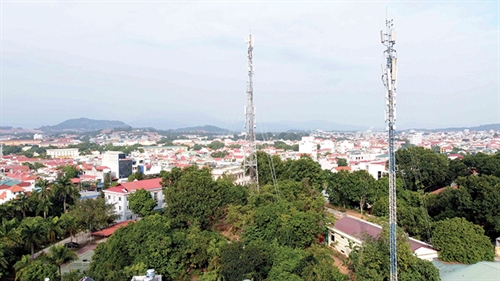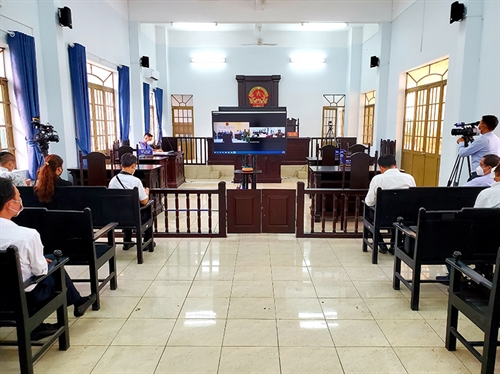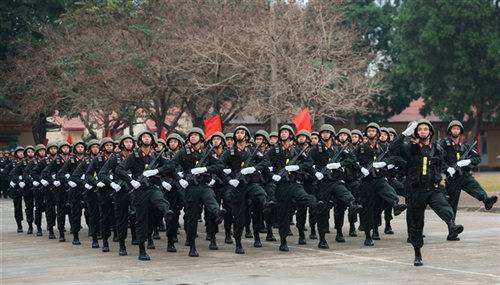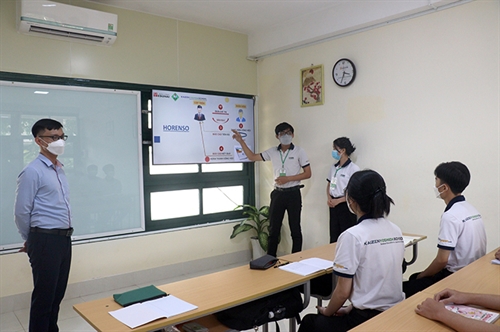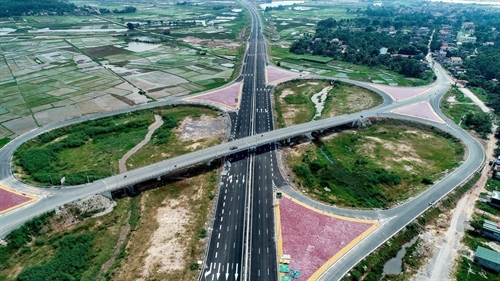The 2022 Law on the Implementation of Grassroots Democracy (the Law), which is the first of its kind in Vietnam, will enter into force on July 1 this year.
As per the Law, implementation of grassroots democracy is a method of promoting the people’s mastery for citizens, cadres, civil servants, public employees and workers to be informed, and express their wills, aspirations and opinions through discussing, giving opinions, deciding on, and examining and supervising matters arising at the grassroots level in accordance with the Constitution and law.
 |
| Casting votes to elect the head of residential quarter 4, Hong Ha ward, Ha Long city, Quang Ninh province__Photo: VNA |
Composed of 91 articles arranged in six chapters, the Law provides for contents and methods of the exercise of grassroots democracy. It specifies the rights and obligations of citizens in, and responsibilities of agencies, units, organizations and individuals for ensuring, the implementation of grassroots democracy. The Law also defines the functions, tasks and powers of People’s Inspection Boards and Community-Based Investment Monitoring Boards in grassroots democracy practice.
As explained in the Law, the scope of “grassroots” covers communes, wards and townships and residential communities in commune-level localities; agencies and non-business units of the Party and the State, socio-political organizations; and enterprises, cooperatives and other organizations that hire and employ labor under labor contracts. These entities will directly organize information publicization and collection of opinions, execute decisions, and be subject to inspection and supervision by citizens, cadres, civil servants, public employees and workers.
Scope of the implementation of grassroots democracy
According to Article 4 of the Law, all citizens will implement democracy in communes, wards, townships, villages and residential quarters where they reside.
As for cadres, civil servants, public employees and workers, they will exercise democracy in agencies or units where they work. In case an agency or a unit has subordinate units, the implementation of democracy at such subordinate units will be decided by the head of the agency or unit.
Meanwhile, workers will practice democracy at labor-employing organizations with which they enter into labor contracts. In case a labor-employing organization has subordinate units, the implementation of democracy at such subordinate units must comply with the charter, internal rules and regulations of the labor-employing organization and relevant laws.
Measures to secure the implementation of grassroots democracy
The Law, in its Article 8, introduces five measures to practice grassroots democracy as listed below:
(i) Providing further training for improvement of professional qualifications of persons tasked to organize the enforcement of the law on the implementation of grassroots democracy;
(ii) Intensifying the public communication and education about the law on the implementation of grassroots democracy, and raising the public awareness about assurance of the practice of grassroots democracy;
(iii) Raising the responsibility of agencies, units and organizations, and the exemplary role of heads, leaders, managers, Party members, cadres, civil servants, public employees and part-time workers in communes, villages and residential quarters in the exercise of democracy and assurance of the implementation of grassroots democracy; regarding the level of grassroots democracy practice by commune-level administrations, agencies, units and organizations as a ground for evaluating their task performance;
(iv) Promptly praising and commending persons who have recorded achievements in the implementation of grassroots democracy, and strictly handling the violators in the exercise of grassroots democracy; and,
(v) Promoting the application of information technology and science-technology, supplying technical equipment, and ensuring other necessary conditions for the implementation of grassroots democracy in conformity with the process of building e-government, digital government and
digital society.
Mechanism to ensure the implementation of grassroots democracy
To institutionalize the role of the Vietnam Fatherland Front and socio-political organizations “as the core for the people to master”, the Law specifies responsibilities of commune-level Vietnam Fatherland Front Committee, Boards for Fatherland Front Affairs in villages or residential quarters, and roles and responsibilities of trade unions and employees’ representative organizations in agencies, organizations and units in each job, step, stage of implementation of democracy (Articles 23, 28, 40, 45, 52, 55, 63, 70, 78 and 82 ).
The Law also adds provisions on responsibilities of citizens, cadres, civil servants, public employees and workers for the practice of grassroots democracy (Articles 24 and 29). Additionally, Articles 9 and 10 of the Law provide for prohibited acts in the exercise of grassroots democracy and handling of violations of the law on the implementation of grassroots democracy in order to maintain discipline in the implementation of grassroots democracy.
Noticeably, persons who violate the regulations on the implementation of grassroots democracy will be administratively sanctioned, subject to application of administrative handling measures or examined for penal liability. Meanwhile, organizations that commit violations of this Law and other laws concerning the implementation of grassroots democracy will, depending on the nature and severity of their violations, be administratively sanctioned.
The Law further says that cadres, civil servants and public employees who abuse their positions and powers to violate this Law, or infringe upon the interests of the State or the lawful rights and interests of organizations and individuals will be disciplined or examined for penal liability; if causing damage, these persons have to pay compensation.
It is stated in the Law that central bodies of political organizations and socio-political organizations will, in pursuance to the principles provided in the Law, other relevant legal documents, and the operation charters of their organizations, provide specific regulations on the implementation of democracy within the agencies and units of such organizations.
Codes and conventions of villages and residential communities, and other decisions of residential communities that are recognized or passed before the effective date of the Law remain valid until they are revised, replaced or annulled.
On the date this Law takes effect, the 2007 Ordinance on the Implementation of Democracy in Communes, Wards and Townships and the 10th National Assembly Standing Committee’s Resolution 55 of August 30, 1998, assigning the task of promulgating regulations on implementation of democracy in operations of agencies, cease to be effective.-
